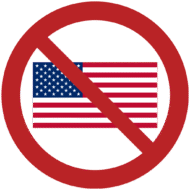Boycott
Let’s look at the practical issues for those wanting to boycott US products.
Firstly, if there is a substitute, it is easy. Want a private jet, don’t buy a US Gulfstream, when you can buy a French Dessault or a Canadian Bombardier. Want a commercial airliner, don’t buy Boeing, when you can buy a European Airbus. This applies to cars, refrigerators, washing machines, vacuum cleaners, etc. In most cases, there isn’t a price difference, or if there is, it is minimal.
What about where there is only one supplier, a US manufacturer. If it is a life-saving drug, then grit your teeth and buy it. If it is software, (e.g. Google or Microsoft, etc) then buy it but start thinking about the migration path to non-US alternatives (because there will be eventually).
What about where the supplier is US, but there is something different. Here you need to use your judgment. This author uses namecheap.com for website domains and hosting and while there are non-US alternatives, the fact that they have most of their support staff in Ukraine makes supporting them a good thing.
Divest
The more capital that US businesses have, the less capital for non-US businesses.
Also, the less demand for US capital, the more expensive it becomes.
Sanctions
For decades the US has avoided global norms because they were the leaders of the “free world” and the “free world” thought they could sensibly use their discretion. The Trump/MAGA world has the explicit and implicit support of ~70% of the US electorate, but has proven to be unworthy of the trust of its historical allies.
We have not only the economic bullying of, now former, allies, but we have crimes against humanity. Think Greenland! No more.
The most effective sanction would be for the United Nations headquarters to relocate from New York. Once that occurred, then there would be other sanctions.
